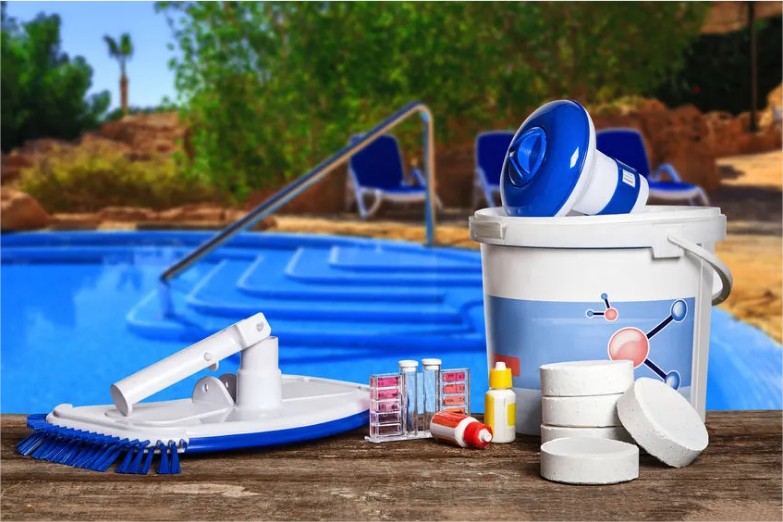
Let’s be honest: we all like to seem super skilled and smart. My personal tricks include:
- Reciting all of “Beauty and the Beast” from memory
- Counting on my fingers how many novels I’ve written, using dramatic pauses
- Using the phrase “nonlinear progression of time”
(I may not be much fun at parties, now that I think about it.)
Anyway, my point is, here’s a topic that you can try out for yourself: science!
Science may not be your specialty, but you can impress your neighbors if you casually explain some chemistry to them in precise scientific terms, so it’s worth a shot.
Plus, it’s never a bad idea to know why you do what you do for pool maintenance. I guess that could be your main motivation instead. Whatever floats your boat.
Either way, prepare to fill yourself with fancy, scientific knowledge about the chemistry of pool chlorine.
Pool Chlorine
Question: What is pool chlorine? What cleans your pool?
Did you answer “actual chlorine”? Sorry, friend. Pool people are actually a little weird about their terminology. Between you and me, some don’t even know the correct answer.
Hypochlorous acid is what kills algae and bacteria fast. It’s also what we measure when we test for “chlorine” in the water.
When I first learned this, I felt like my whole life had been a lie. I empathize with you if you feel the same way.
Now, you have options for what you add to the water initially. (Pool people often call these compounds “chlorine,” but that’s chemically incorrect.) They’ll come either as a liquid or compressed into granular or tablet form.
Some of the common pool chemicals:
- Sodium hypochlorite (liquid)
- Di-chlor (granular)
- Tri-chlor (stick/tablet)
- Lithium hypochlorite (granular)
- Calcium hypochlorite (granular or tablet)
Note that they do all include chlorine. However, in the end, after they’ve reacted with the water, the chemical compound hypochlorous acid (HOCl or HClO) cleans your pool water, not pure chlorine (Cl2).
In addition, pool chlorine needs a stabilizer so that sunlight doesn’t leach it from the water. The most common stabilizer is cyanuric acid, which is unfortunately abbreviated CYA. (I think they should’ve thought that through better, but no one asked me.)
The Chemical Processes
You start out with pool water (obviously) and whatever chlorine additive you choose. If you have a salt-chlorine generator, you use salt (NaCl).
After you pour that additive into the water, their reaction creates hypochlorous acid (HClO), the chemical compound that will kill algae and bacteria and destroy dirt.
Normal “chlorine”
Standard chlorine additives are relatively simple. You don’t need any fancy machinery; they produce HClO right upfront.
If you like to see reactions in simple chemistry terms, these are the equations for lithium hypochlorite, calcium hypochlorite, and sodium hypochlorite respectively.

For these additives, you’ll end up with hypochlorous acid and a hydroxide variant.
Hydroxides are basic, meaning they raise the pH of the water so it’s not too acidic.

Salt Chlorine Generator
If you have a salt-chlorine generator, though, things get a little more complicated.

The first reaction is what the salt chlorine generator does for you.
The generator’s cell separates the salt (NaCl) to produce actual chlorine (Cl2).

The second reaction is how the chlorine reacts to the water and becomes hypochlorous acid.
Reaction #1
First, the electrolysis of saltwater produces pure chlorine.
When electricity passes through 2NaCl (salt) and 2H20 (water), they separate into Cl2 (gaseous chlorine) + 2NaOH (sodium hydroxide) + H2 (hydrogen).
We get some side products that are immediately good to go:
- Sodium hydroxide
- Hydrogen, a normal part of water (since pH measures hydrogen ions)
The chlorine isn’t done yet, though.
Reaction #2
Second, the pure chlorine reacts with more water and becomes hypochlorous acid.
When the gaseous chlorine (Cl2) mixes with the water (H2O), the reaction produces HOCl (hypochlorous acid) + HCl (hydrochloric acid).
There’s that hypochlorous acid we want!
The other product has a similar name, but don’t let that fool you. Hydrochloric acid (HCl), or muriatic acid, lowers the pH of the water so it doesn’t become too basic.
Should I Use a Salt Chlorine Generator?
Here at Neptune Pools, we acknowledge the benefits of salt chlorine generators with one huge caveat: You must check and adjust your water at least once a week.
If you neglect to do this (and honestly, most do), you could destroy your pool finish and equipment. The biggest downside to salt systems is that they are too easy. Most people are completely unaware that both their pH and chlorine are way out of whack.
If you decide to go with a salt system, do yourself a huge favor and stay on top of your water chemistry.
Unfortunately, salt chlorinators are a bit sketchy with concrete pools because of the effect that salt has on cementitious surfaces. If you have a vinyl liner pool, the saltwater will also cause metal wall panels to rust/corrode when the liner leaks. It will also corrode the standard aluminum coping of vinyl pools.
You can enjoy the full benefits of saltwater if you have a fiberglass pool.
At Neptune Pools, we manufacture and install fiberglass pools in Panama. Wondering how much your fiberglass pool might cost? Contact us using the button below to get a custom estimate for your project.